/On Campus/
Kwon Sho-young, Choi Yoo-chan Reporters
⚫ Election Campaign of JBNU
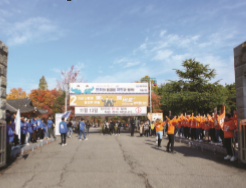
The election campaign took place from November 4-12, the days before election day. Students running for office, campaigned on campus from November 4th-12th, just days prior to the election of the new student government. To hold fair elections, all expenses used during each candidates’ campaigns were paid by the school and were less than 500,000 won. The election campaigns at JBNU were divided into three categories: street campaign cheering, policy debate, and classroom campaigning. Most of the students would have seen the street campaign cheering. Candidate supporters, who participated in the street campaigns amounted to less than 60 per each student council candidate team. Campaigners had to wear name tags approved by the JBNU National Election Commission. Campaigners had to organize teams composed of at least two people, who would distribute promotional handouts and shout slogans. All campaigners were banned from wearing uniforms indoors and were required to leave the school campus wearing campaign uniforms.
The student council candidates walked around the school to introduce themselves and ask for students’ support. Campaigners also helped them by shouting their team chant and passing out promotional handout, including candidates’ policies with their campaign promises written on them, to students. The biggest event in the campaign, was a cheering battle in front of JBNU’s Old Gate. The campaigners for each student council candidate team cheered for their team in turn, dancing and singing there cheers several times during the day when there was high foot traffic.
Candidates of JBNU’S Student Council Speak during Policy Debate
The policy debate was held on November 6th at the JBNU Academic & Cultural Center. The intention of this debate was to help students choose next year’s new student council. The new student council’s candidate teams’ names were ‘Baro’ and ‘Paran’. The debate process consisted of ‘an introduction of candidates & topic of debate’, ‘panel questions’, ‘free discussion’, and ‘audience questions’. And it was broadcasted live through the UBS (University Broadcasting Station)’s facebook account and on JBNU’s YouTube Channel. JBNU Globe picked one topic for each part of the debate, in order to let readers know about what they might be interested in.
-Part 1: Introduction of Candidates & Debate Topic
This debate’s topic, selected by GLOBE, was: “The of using an anonymous community”. Paran said the positive side of using an anonymous community refer to online comments, is that students can freely speak their mind. But they were disappointed that some blind blaming comments were still expressed. So, they announced that if they can find points for improvement, students can choose to use a second-best solution community. Baro responded to this topic by saying that there are some people posting inaccurate information, which hurt others. He added that, if the anonymous community can be a place where only accurate and confirmed information is posted, and thoughtless or spiteful comments were left out, it could be a sufficient form of communication for students.
-Part 2: Panel Query
JBNU Globe reporter, Kwon Sho-young asked to the Vice-Presidential candidate from the Baro team about installing a smoking booth. “According to the Ministry of Health and Welfare, if universities are planning to install smoking booths, they must be placed at least ten meters away from the buildings’ entrance.” Then the Vice-Presidential candidate of team Baro said that they were already aware of that information and they will follow its instructions after they ask students about the installation area of the proposed smoking booths.
-Part 3: Free Discussion
Free discussion is a candidate’s initiative during a debate. During such an initiative, one candidate is allowed to ask the other a question. Paran asked about Baro’s policy pledge, ’the new temperature control system in the Central Library’. It is a system which can control AC & heater through the actual temperature of the Central Library, rather than following the existing temperature control system which controls the temperature at a set time in accordance with government guidelines. Paran pointed out that this system will cost more than 2.5 billion Won a year. Baro agreed with it and said that budgets will be adjusted according to the changing weather.
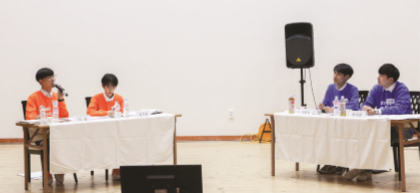
⚫ JBNU National Election Commission
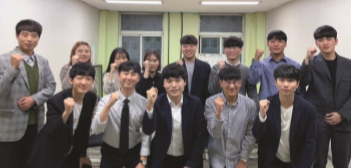
The National Election Commission is designed to elect the president of the student council for the next year and help students to elect a new leader for the student council through a democratic process. The student council consists of 14 members, including five general members from among students and three from a the JBNU Press. The National Election Commission publishes election-related schedules and important information such as a ballot tally and the results of the election.
It also produces and promotes policy data books, posters and banners of candidates that students should know during the election period. The National Election Commission handles most of the work related to campaigns and policy debates, and handles all tasks related to voting and ballot counting. The most important task of the National Election Commission is to oversee each candidate’s team, ensuring that they comply with election-related rules.
There were students who did not receive text message URLs despite being voters during the student council elections, and there were many small errors. Therefore, the student council election had to be held again the next day.
⚫ The Results of the Election
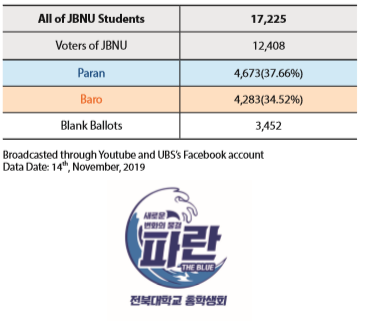
⚫ Interview with the New Student Council, ‘Paran’
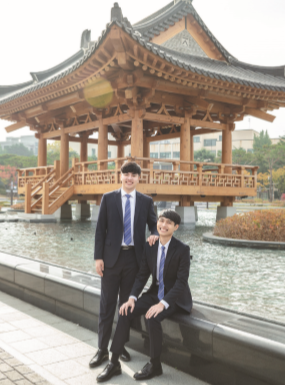
Q. How do you feel being the newly elected Student Council President?
A. (The President of Paran, Lee Won-suk): The 58 pledges we put forward were based on the fact that JBNU students felt uncomfortable through our surveys which we made in preparation for the election. So, I feel very grateful to them for giving us various opinions.
(The Vice-President of Paran, Jung Seok-jun): When I lost the election last year, I felt it was difficult to approach students. But when I was preparing for this year's election, I had a chance to listen to students and think about what I would need to do during my term as VP when elected. So, thank you for giving me this opportunity.
Q. What do you think is the most important pledge for this term?
A. (The President of Paran, Lee Won-suk): It’s hard to pick one thing. But I want to let you know that there are two big categories of pledges we have put forth; Student participation and learning within the Bachelor’s degree system.
Q. Lastly, what does ‘Paran’ want to say to JBNU students?
A. (The President of Paran, Lee Won-suk): In 2020, we want to make a student council that listens to the opinions of JBNU students above all. JBNU students are not really interested in the student council, but we will try to make sure that all students recognize and participate in the activities of the student council. We would appreciate it if you could critique us on our mistakes and praise us for our achievements.
Construction of JBNU’s Institute for Education Innovation and Main Entrance Completed
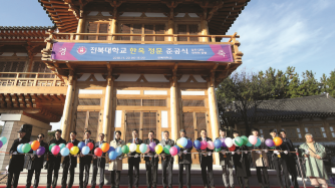
The construction of the institute for education innovation and Korean traditional style main entrance has been completed. The building’s dedication and unveiling ceremony was held on the 20th of November. There were about 100 attendees, comprised of school officials, construction managers and donators. Included in the program was also an award ceremony for the donors who contributed substantial amounts of funding to cover the construction of the building. The signboard of the main entrance read “Jeonbuk National University” was written by Professor Kim Byeong Gi of the Department of Chinese Literature. JBNU’s President, Kim Dong-won said, “The project was completed successfully, thanks to a lot of effort. We will do our best to improve our aspect of accompanying with local community.” Disposal of the old building will soon be decided by the university’s administration (and the institute for development funding)
JBNU Opens Agriculture and Livestock Product Pilot Complex in Uganda
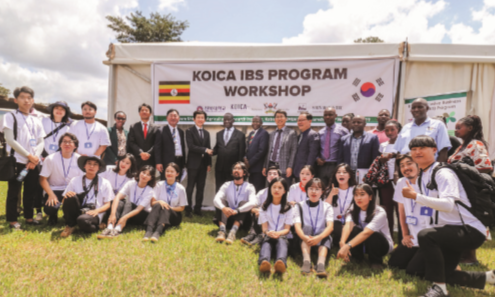
JBNU held a ‘Korean-style agriculture and livestock products pilot complex opening ceremony in Uganda’ with Makerere University, partner companies, and KOICA on October 13th in Kabanyoro, Uganda. The project was funded by JBNU, private companies, and KOICA to build a pilot complex of Korean agriculture and livestock on the site of the Makerere University agricultural laboratory. Moreover, they provided technical dissemination and rural-farmer education for up to two years. Professor Heo Jae-young, who planned and promoted the project on behalf of the JBNU International Agricultural Development and Cooperation Center said, “The Korean-style pilot complex of Ugandan agriculture and livestock products, will help grow Uganda as a leader of the agriculture and livestock industry in Africa. Also, it will contribute to business operations and job creation for the youth in both countries.”
JBNU Ranks 2nd among Flagship Korean National Universities
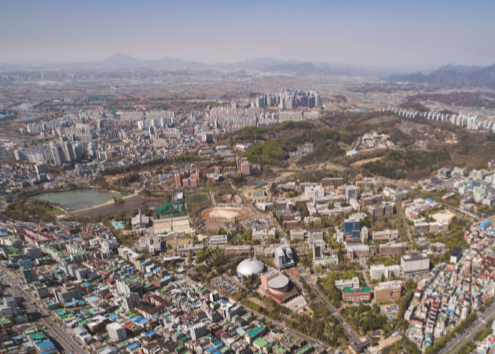
In the 2019 university evaluation released by the Joongang Ilbo on November 16th, JBNU ranked second among the Flagship Korean National Universities. In this year, JBNU ranked 20th out of 50 universities, up five notches from last year. The reason that JBNU was able to achieve good results in the university evaluation was because JBNU invests a lot in education. JBNU invested an average of 17,370,000 won per student. The figure is higher than an average of 15,540,000 won. JBNU's tuition is about 4,000,000 won. In this respect, students enjoy education benefits that are about four times the tuition. The President of JBNU, Kim Dong-won said, "there is no need to be swayed by the university's evaluation, but it is a meaningful result that can identify the strengths and weaknesses of JBNU. JBNU 's status will be higher through the efforts to invest in education"
JBNU Opens Café ‘Aromi masil’ Run by People with Disabilities
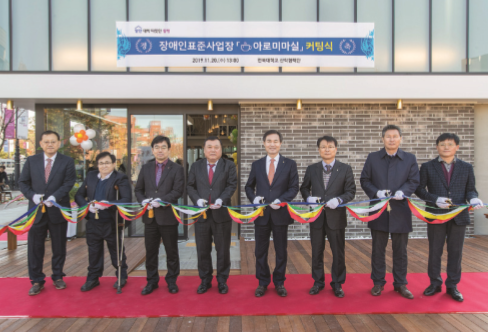
JBNU has constructed a new café called ‘Aromi masil’ to make jobs for a social minority group. Aromi masil is built outside of New Silkroad Center. On November 20th, the building completion ceremony was held. The President of JBNU Kim Dong-won, Korea Employment Agency for Persons with Disabilities branch manager of Jeonbuk province, and the clerk of the café Aromi masil attended the building completion ceremony. The unique name, ‘Aromi masil,’ means “village with beautiful people,” in Korean. In addition, this new café is not only for creating job opportunities but also for improving welfare programs for persons with disabilities. Aromi masil has employed one manager and 12 clerks, who are individuals with disabilities . JBNU’s Industrial Research Center also supported Aromi masil through the Korea Employment Agency by training clerks in its barista and customer service program for three months.
JBNU Holds Hands with KSNU
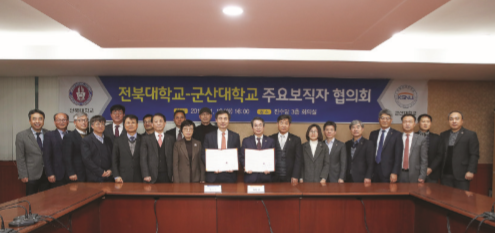
JBNU is ‘holding hands’ with Kunsan National University to develop regional solidarity. JBNU and KSNU had a meeting on November 19th. In this meeting, good result is expected because JBNU and KSNU agreed each other with practical interchange ways that exchange grade, and utilize education and research support facility, etc. JBNU is holding hands with Kunsan National University in order to develop regional solidarity within Jeollabuk Province. On November 19th, representatives from the two national universities conducted a meeting, during which each side agreed with practical ways for facilitating an interchange between the two campuses. For example, each party can utilize educational and research facilities for various projects and events. One of the highlights of the agreement is allowing students to take 10% of course offerings within the other university’s system, receiving a grade as if the course were part of their own institution. In addition to this, by listening to various opinions, each university expressed their willingness to actively pursue innovative cooperation through this partnership. JBNU President, Kim Dong-Won, said, “From now on, our university must be changed. I will make an effort to prepare JBNU for the unpredictable tomorrow; to be able to play a key role as a new engine for regional development.
JBNU College of Pharmacy Recruits the First Freshmen
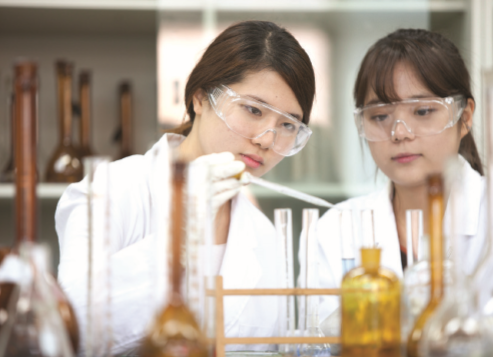
The College of Pharmacy, which is focused on research-oriented pharmacy, selected its first freshmen students through the university transfer system. The university recruits 33 people, 50% of whom were chosen as local talents. Applicants must complete at least a second year of college and have passed the official Pharmacy Education Eligibility Test (PEET) for the current year. The College of Pharmacy will lead the 'Natural Agricultural Products-Based New Drug Development Field,' strategically promoted by Jeollabuk-do. It is expected to be the center of Asia smart agricultural life valley based in Saemangeum. Chae Hanjung, the Director of the College of Pharmacy, said that the university is regarded as the best place for drug development research based on natural products because of the foundation of JBNU's convergence research and cooperative systems with public institutions such as the Rural Development Administration."

